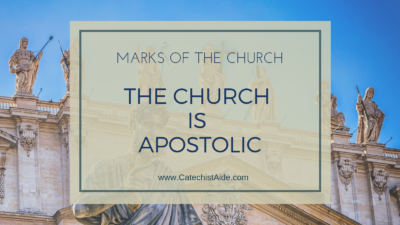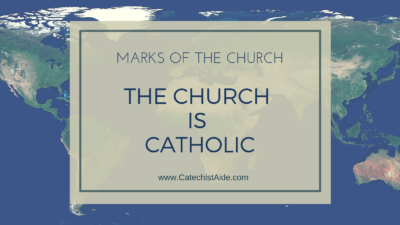This is the final installment in a blog post series on the marks of the Church. Previous posts explored how the Church is one (found here), holy (here) and catholic (here). Today I will discuss why and how the Church is apostolic.
Founded on the Apostles
When we say that the Church is apostolic, we mean that it continues the teachings and mission of the apostles, upon whom Jesus founded the Church. The Youth Catechism explains,
Our Church is apostolic because it holds and teaches the faith, as taught to the twelve apostles by Christ himself. We refer to the apostles as “hand-picked successors” since Jesus chose them to continue his mission after his death and Resurrection. He entrusted the leadership of his Church to the apostle Peter saying, “You are Peter, and upon this rock I will build my church, and the gates of the netherworld shall not prevail against it” (Matthew 16:18). Thus Peter became the first bishop and pope. Through these actions, Jesus wasn’t setting up his friends in positions of power, influence, and honor. Instead, he was calling them to a life of service as missionaries for his Church. All the bishops and popes who have followed, up to the present day, share this mission.
Priests, Prophets, and Kings
We say that the pope and bishops share in Christ’s ministry as priests, prophets and kings. As priests, the pope and bishops celebrate the Eucharist and all the sacraments to lead their people to holiness. As prophets, they are the official teachers of the Church. And as kings, they speak with authority just as Jesus did. This is an important aspect of the apostolic nature of our Church. Jesus commissioned the apostles to preach in his name. He gave them the authority to baptize, to heal and to forgive sins. He also gave them the authority to generate additional disciples of the Church, so that their mission would continue in perpetuity. This apostolic succession through the sacramental anointing of bishops and popes ensures the continuity of the teachings of Christ.
Infallibility
In his capacity as the official teacher of the Church, Catholics believe that the Pope has the gift of infallibility. The dictionary defines infallibility as the “the quality of being infallible; the inability to be wrong” that is to be free from error. In the Roman Catholic Church, our belief in Papal Infallibility qualifies that to mean:
Therefore, when the pope proclaims a teaching on faith or morals, we trust that it is true and right – not because the pope is perfect and can’t make a mistake, but because the Holy Spirit, who is the Spirit of Truth, guides him in such matters.
Takeaway for Teens
The apostolic nature of our Church gives us confidence that its teachings are rooted in Christ. We can trust that by participating in the sacraments, we can grow closer to Christ through grace. Pope Francis reminds us that we are all called to “go out” just as the apostles were called by Jesus. “Belonging to the apostolic Church means being aware that our faith is anchored in the proclamation and the witness of the very Apostles of Jesus — it is anchored there, it is a long chain which comes from there —; and for this we always feel sent, we feel delegated, in communion with the Apostles’ successors, to proclaim, with the heart filled with joy, Christ and his love, to all mankind.” (General Audience of 17 September 2014 | Francis)
© 2018 Catechist’s Aide





